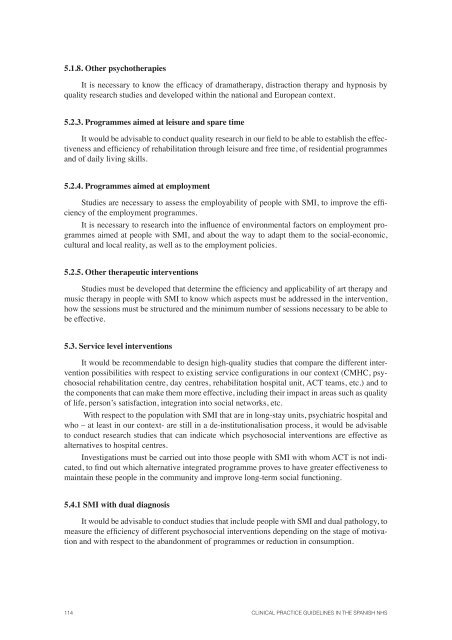CPG for Psychosocial Interventions in Severe Mental ... - GuÃaSalud
CPG for Psychosocial Interventions in Severe Mental ... - GuÃaSalud
CPG for Psychosocial Interventions in Severe Mental ... - GuÃaSalud
You also want an ePaper? Increase the reach of your titles
YUMPU automatically turns print PDFs into web optimized ePapers that Google loves.
5.1.8. Other psychotherapies<br />
It is necessary to know the efficacy of dramatherapy, distraction therapy and hypnosis by<br />
quality research studies and developed with<strong>in</strong> the national and European context.<br />
5.2.3. Programmes aimed at leisure and spare time<br />
It would be advisable to conduct quality research <strong>in</strong> our field to be able to establish the effectiveness<br />
and efficiency of rehabilitation through leisure and free time, of residential programmes<br />
and of daily liv<strong>in</strong>g skills.<br />
5.2.4. Programmes aimed at employment<br />
Studies are necessary to assess the employability of people with SMI, to improve the efficiency<br />
of the employment programmes.<br />
It is necessary to research <strong>in</strong>to the <strong>in</strong>fluence of environmental factors on employment programmes<br />
aimed at people with SMI, and about the way to adapt them to the social-economic,<br />
cultural and local reality, as well as to the employment policies.<br />
5.2.5. Other therapeutic <strong>in</strong>terventions<br />
Studies must be developed that determ<strong>in</strong>e the efficiency and applicability of art therapy and<br />
music therapy <strong>in</strong> people with SMI to know which aspects must be addressed <strong>in</strong> the <strong>in</strong>tervention,<br />
how the sessions must be structured and the m<strong>in</strong>imum number of sessions necessary to be able to<br />
be effective.<br />
5.3. Service level <strong>in</strong>terventions<br />
It would be recommendable to design high-quality studies that compare the different <strong>in</strong>tervention<br />
possibilities with respect to exist<strong>in</strong>g service configurations <strong>in</strong> our context (CMHC, psychosocial<br />
rehabilitation centre, day centres, rehabilitation hospital unit, ACT teams, etc.) and to<br />
the components that can make them more effective, <strong>in</strong>clud<strong>in</strong>g their impact <strong>in</strong> areas such as quality<br />
of life, person’s satisfaction, <strong>in</strong>tegration <strong>in</strong>to social networks, etc.<br />
With respect to the population with SMI that are <strong>in</strong> long-stay units, psychiatric hospital and<br />
who – at least <strong>in</strong> our context- are still <strong>in</strong> a de-<strong>in</strong>stitutionalisation process, it would be advisable<br />
to conduct research studies that can <strong>in</strong>dicate which psychosocial <strong>in</strong>terventions are effective as<br />
alternatives to hospital centres.<br />
Investigations must be carried out <strong>in</strong>to those people with SMI with whom ACT is not <strong>in</strong>dicated,<br />
to f<strong>in</strong>d out which alternative <strong>in</strong>tegrated programme proves to have greater effectiveness to<br />
ma<strong>in</strong>ta<strong>in</strong> these people <strong>in</strong> the community and improve long-term social function<strong>in</strong>g.<br />
5.4.1 SMI with dual diagnosis<br />
It would be advisable to conduct studies that <strong>in</strong>clude people with SMI and dual pathology, to<br />
measure the efficiency of different psychosocial <strong>in</strong>terventions depend<strong>in</strong>g on the stage of motivation<br />
and with respect to the abandonment of programmes or reduction <strong>in</strong> consumption.<br />
114 CLINICAL PRACTICE GUIDELINES IN THE SPANISH NHS

















